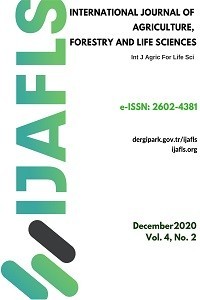A part of sustainable agricultural sector: biodynamic agriculture
A part of sustainable agricultural sector: biodynamic agriculture
Biodynamic Agriculture Organic Agriculture, Ecology, Anthroposophy,
___
- Adams, G., 2004. Agricultural Course the Birth of Biodynamic Method. Rudolph Steiner Press, 2004. ISBN: 978 1 85584 142 2
- Akalın, M., (2014). “İklim Değişikliğinin Tarım Üzerindeki Etkileri: Bu Etkileri Gidermeye Yönelik Uyum ve Azaltım Stratejileri”, Hitit Üniversitesi Sosyal Bilimler Enstitüsü Dergisi, Yıl 7, Sayı 2, ss. 351-377.
- Anonymous, 2019. https://www.demeter.net/statistics.
- Babita, A. N, Thakur M. 2015. Organic farming: a holistic approach towards sustainable fruit production. European Journal of Pharmaceutical and Medical Research. 2(6): 108-115.
- Başoğlu A, Telatar O. M., 2012. İklim Değişikliği’nin Etkileri: Tarım Sektörü Üzerine Ekonometrik Bir Uygulama, Karadeniz Teknik Üniversitesi Sosyal Bilimler Dergisi, 6, 7-25.
- Bayturan, N., 2018. Rudolf Steiner, Antroposofi ve Biyolojik-Dinamik Tarım. Apelsayon Dergisi; Ocak2018 Sayı:50 ISSN: 2149-4908
- Bilgin, B., Akyüz, S. S., 2008. Organik Tarımla Elde edilen Unların Pestisit İçerikleri ve Bu Unlardan Üretilen Ekmeklerin Bazı Kalite Kriterlerinin belirlenmesi Üzerine Bir Araştırma, Türkiye 10. Gıda Kongresi; 21-23 Mayıs 2008, Erzurum.
- Brinton, W., York, A., 1993. Sustainable Composting in the Wineyard. Practical Winery and Vineyard. 58 Paul Drive, Ste. D, San Rafael, CA 94903 • 415-479-5819 https://woodsend.com//wp-content/uploads/2016/05/sustainable_composting_vineyardI.pdf
- Carpenter-Boggs L., Reganold, J.P., Kennedy, A. C., (2000) Effects of Biodynamic Preparations on Compost Development, Biological Agriculture & Horticulture, 17:4, 313-328, DOI: 10.1080/01448765.2000.9754852
- Çakır, Ö., Yıldız, H. ve Karataş, N., 2018. Biyodinamik Tarım ve Organik Tarımın Karşılaştırılması, Türk Tarım – Gıda Bilim ve Teknoloji Dergisi, 6(4): 438-443.
- Çetiner S. 2005. Türkiye ve Dünyada Tarımsal Biyoteknoloji ve Gıda Güvencesi: Sorunlar ve Öneriler. GDO Bilgi Platformu.
- Demir, A., 2009 Küresel İklim Değişikliğinin Biyolojik Çeşitlilik ve Ekosistem Kaynakları Üzerine Etkisi, Ankara Üniversitesi Çevre Bilimleri Dergisi, Cilt 1, Sayı 2, Sayfa 37- 54.
- Deviren, V. ve Çelik, N., 2017. Dünya'da ve Türkiye'de Organik Tarımın Ekonomik Açıdan Değerlendirilmesi. Uluslararası Sosyal Araştırmalar Dergisi. Feb2017, Cilt. 10 Sayı 48, s669-678. 10p.
- Diver, S., 1999. Biodynamic Farming & Compost Preparation. Appropriate Technology Transfer for Rural. 800-346-9140
- Dung, L., Hiep, N., 2017. The revolution of agriculture 4.0 and sustainable agriculture development in Vietnam. International Conference “Emerging issues in economics and business in the context of international integration" Proceedings (EIEB), 1(1), 317-328.
- Kanat, Z., Keskin, A., 2018. Dünyada İklim Değişikliği Üzerine Yapılan Çalışmalar ve Türkiye'de Mevcut Durum. Atatürk Üniv. Ziraat Fak. Derg., 49 (1): 67-78.
- Kurtuluş, M., 2019. Avrupa Birliği Ülkelerinde Organik Tarımın Mevcut Durumu ve Gelişme Potansiyeli. Eurasian Journal of Researches in Social and Economics (EJRSE). ASEAD Cilt 6 Sayı 1 Yıl 2019, S 167-186
- Mithunesh, P., Gupta, K., Ghule, S.ve Hule, S., 2015. Aeroponic Based Controlled Environment Based Farming System. IOSR Journal of Computer Engineering (IOSR-JCE) e-ISSN: 2278-0661, p-ISSN: 2278-8727, Volume 17, Issue 6, Ver. II (Nov – Dec. 2015), PP 55-58.
- Önaldı, A. T., 2014. Dünya ve Türkiye'de organik büyükbaş ve küçükbaş hayvan yetiştiriciliğine yönelik yasal düzenlemelerin karşılaştırılması. Diss. Selçuk Üniversitesi Fen Bilimleri Enstitüsü
- Reganold, J. P., 1995. Soil quality and profitability of biodynamic and conventional farming systems: A review. American Journal of Alternative Agriculture. Volume 10, Issue 1March 1995, pp. 36-45
- Sayın, C., R.G. Brumfield, B. Özkan and N.M. Mencet, 2005. The Organic Farming Movement in Turkey. Production and Marketing Report, HortTechnology, Vol. 15(4).
- Thun, M., 1994. Erfahrungen für den Garten. ISBN 1 869 890 32 9
- Yayın Aralığı: Yılda 2 Sayı
- Başlangıç: 2017
- Yayıncı: Volkan OKATAN
Polyphenol content and antioxidant capacity of berries: A review
Muhammet Ali GÜNDEŞLİ, Nazan KORKMAZ, Volkan OKATAN
The effect of particle sizes on ammonium adsorption kinetics and desorption by natural zeolites
Veli UYGUR, Canan ŞANLI ÇELİK, Enise SUKUSU
Coat proteın variability of Apple mosaic virus isolates from different plant hosts
Effect of variety and planting dates on mungbean green pod and dry seed yields
Ezzat ABD EL LATEEF, Ahmed EATA, Mostafa ABD EL-SALAM
Effects of fig seed flour on some quality parameters of cookies
An assessment of livestock breeding and livestock production in turkey
Figen CEYLAN, Metin Göksel AKPINAR, Çağrı BAYRAKTAR, Duygu BAYRAKTAR, Esra MÜLAZIMOĞULLARI
Virus diseases of lettuce in ankara province
Filiz ERTUNÇ, Filiz Randa ZELYUT
Investigation of some blackberry cultivars in terms of phenological, yield and fruit characteristics
İlknur ESKİMEZ, Mehmet Polat, Nazan KORKMAZ, Kerem MERTOĞLU
A part of sustainable agricultural sector: biodynamic agriculture
Hakan KARADAĞ, Berk ÜNAL, Burcu AKSÜT
The possibility to control diseases caused by colletotrichum species in strawberries
